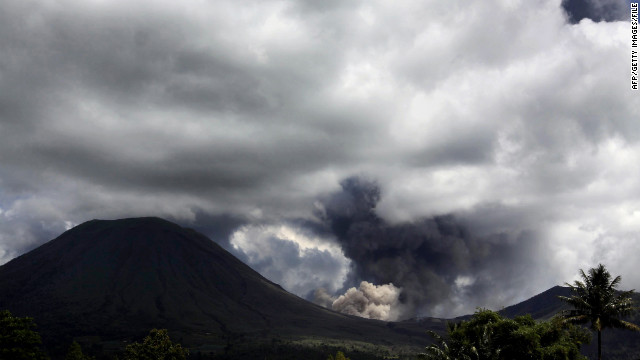
- Eruptions began at Mount Lokon in Noth Sulawesi province on Friday
- Loud, explosive eruptions Sunday prompt authorities to put all on alert, an official says
- At 800 meters high, Mount Lokon is among the most active volcanoes in the region
Read a version of this story in Arabic
(CNN) -- Fresh lava and ash spewed Sunday from a volcano in northeast Indonesia, casting haze over the crater and prompting authorities to warn nearby residents, state news reported.
Loud, thumping noises were heard at a monitoring post 6 kilometers (3.8 miles) from where Mount Lokon erupted around 2:05 p.m. (2:05 a.m. ET) Sunday, said Sutupo Purwo Nugroho of Indonesia's National Disaster Mitigation Board, as reported by the official Antara news agency.
The volatile activity continued after that, though authorities could not immediately ascertain how many additional, separate eruptions had occurred.
"Right now, there are still eruptions, but they could not be observed as the volcano is covered by haze," said Nugroho.
Those living within 2.5 kilometers (1.5 miles) of the volcano, which is in the Pacific island nation's North Sulawesi province, are being told to limit outdoor activity, according to Nugroho, who heads the mitigation board's data and information center.
The volcano has been active since last Friday, with some eruptions spewing ash 1,500 meters into the air. One day earlier, officials issued an early warning to residents -- yet Mount Lokon was still categorized as idle until Sunday, as it is now on alert status.
Indonesia is on the "Ring of Fire," an arc of fault lines circling the Pacific Basin that is prone to earthquakes and volcanic eruptions.
According to the Smithsonian National Museum of Natural History's Global Volcanism Program, Lokon is the higher of twin volcanic peaks separated by 2.2 kilometers (1.4 miles) in northeast Indonesia. At 800 meters (2,600 feet) high and with a flat top, it is one of the most active volcanoes in the region.
In February, for instance, the restless volcano spewed clouds of ash 2 kilometers into the sky, said Indonesia's disaster management agency.
Residents at that time were warned to stay away from the volcano, but not to leave their homes, Nugroho said.
That was unlike in July 2011, when a series of Lokon eruptions prompted the evacuation of more than 4,000 locals.


